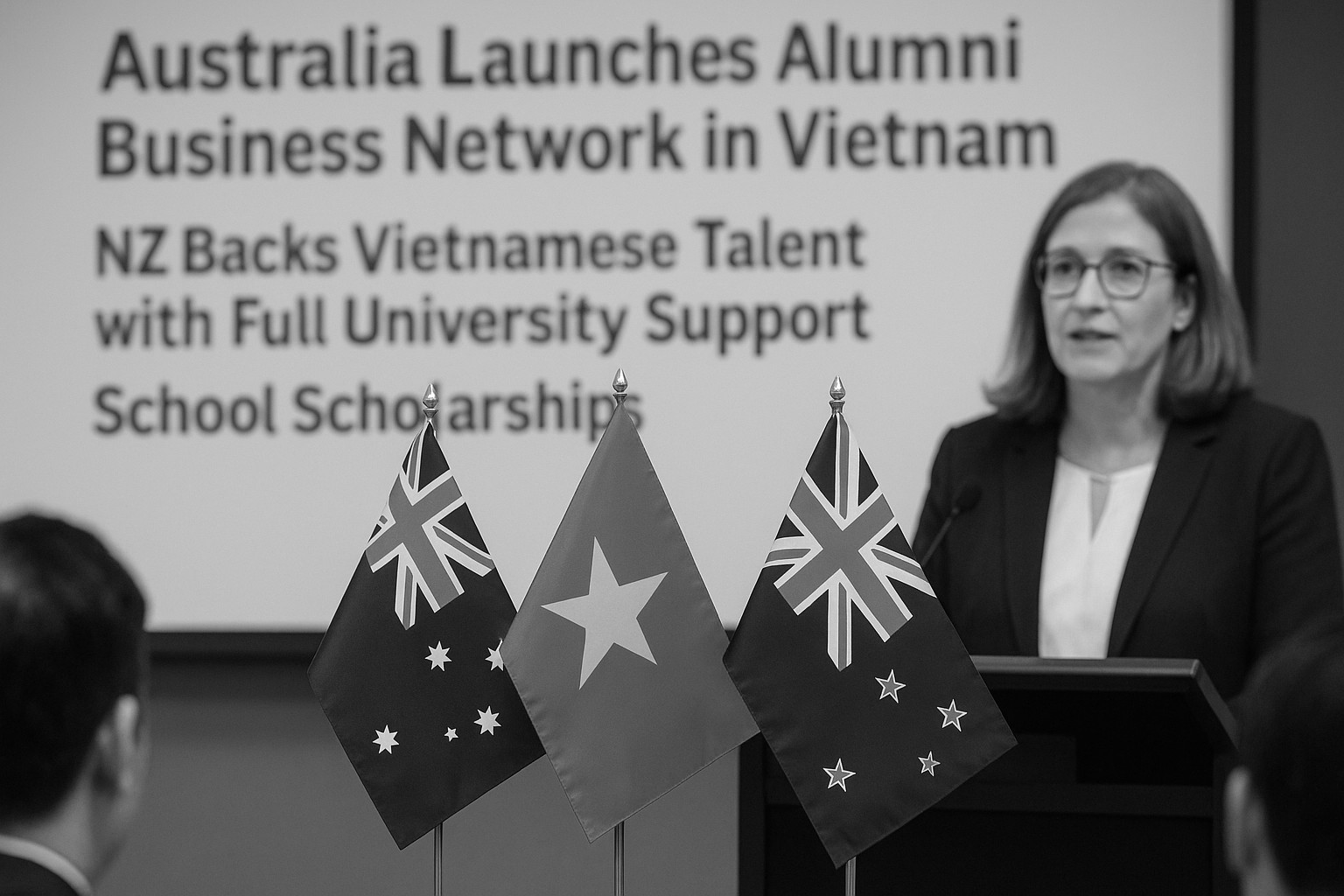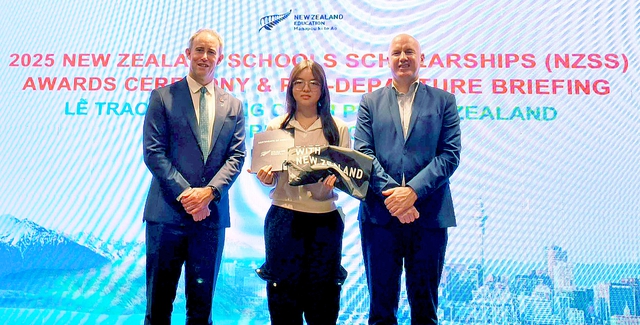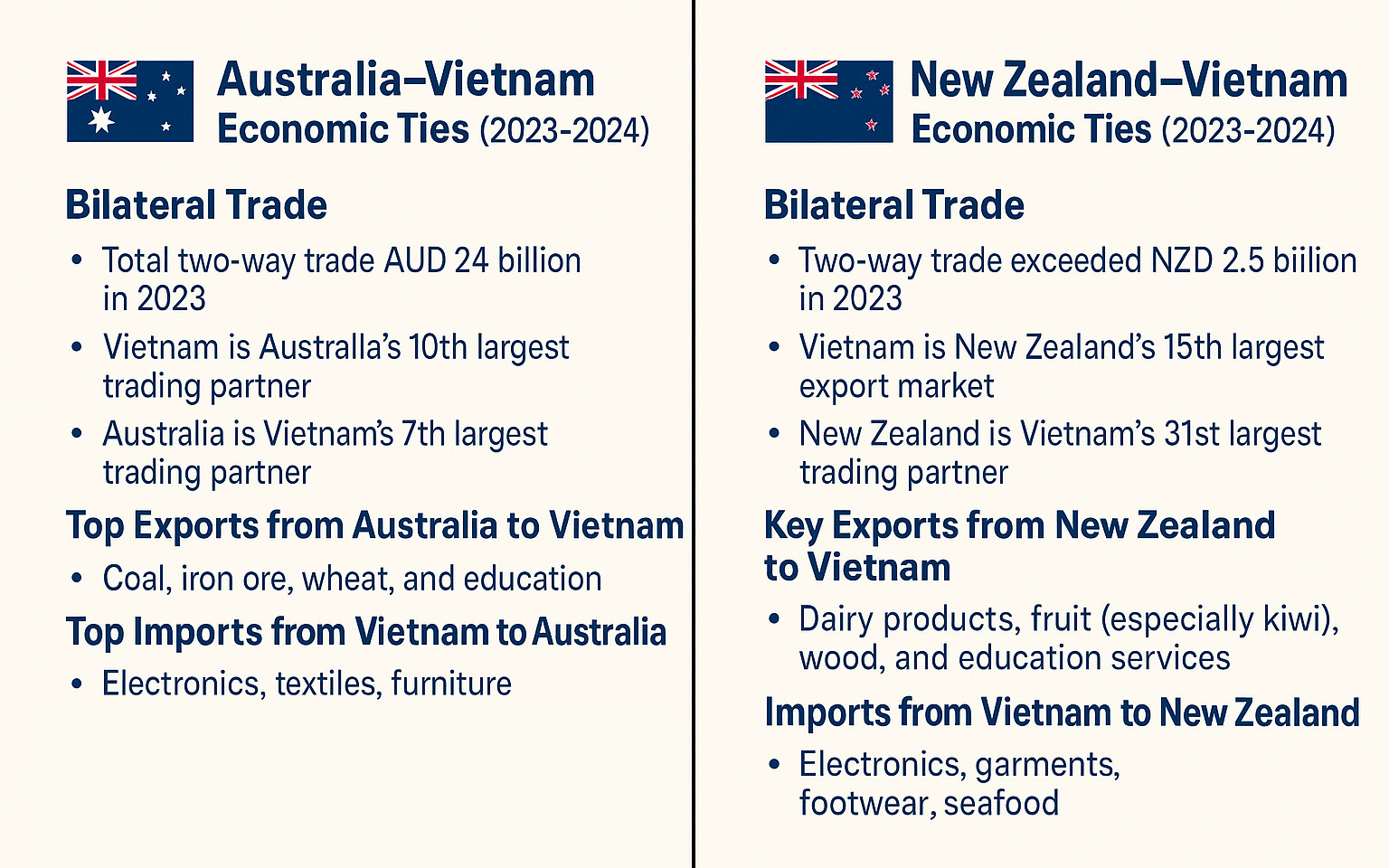
As Southeast Asia continues its rise as a global economic powerhouse, Vietnam is emerging as a central node in Asia-Pacific integration — not only through trade and manufacturing, but also through deepening education, business, and cultural ties.
In July 2025, this shift became more tangible, with new initiatives launched by Australia and New Zealand aimed at investing in Vietnam’s future talent and long-term collaboration.
These growing connections are more than symbolic — they signal a transformational shift in how the region shares talent, builds trust, and prepares for a more interconnected commercial future.
July 15: Australia Launches Alumni Business Network in Vietnam
The Australian Government, in collaboration with Dear Our Community, unveiled the Australian Alumni Business Network — a bold initiative designed to connect over 160,000 Vietnamese alumni of Australian education. This is more than a networking platform: it’s a bridge between two economies.
With advisory board members from key industries like the digital economy, green energy, agriculture, and education, the initiative strengthens Australia–Vietnam ties through entrepreneurship, innovation, and business development.
Australia’s Consul General Sarah Hooper called it a “landmark initiative that highlights the long-term value of investing in trust and people connection.” The alumni-led model promises high-impact results in both countries, helping Australian businesses access Vietnam’s professional ecosystem — a young, tech-savvy, and increasingly English-proficient workforce.
New Zealand Backs Vietnamese Talent with Full University Support
Meanwhile, all eight of New Zealand’s public universities are now offering tailored support to Vietnamese students under Project 89, Vietnam’s national initiative to train university faculty abroad.
These institutions — ranked in the top 2% globally, including the University of Auckland, Otago, and Wellington — provide extensive financial, academic, and logistical support to Vietnamese doctoral and master’s candidates, enabling them to gain global experience and bring back valuable expertise to Vietnam’s universities and research centers.
But New Zealand’s commitment doesn’t stop at the postgraduate level.
In June 2025, twenty outstanding Vietnamese middle and high school students were awarded New Zealand Schools Scholarships (NZSS) — a program launched in 2019 to attract top international talent at a younger age. The selected students, currently in grades 8 to 10, will begin their studies in July 2025 or January 2026, receiving a 50% tuition subsidy, as well as full support in housing, cultural integration, and academic guidance.

This early investment reflects New Zealand’s strategic intent: to build lifelong links with Vietnam’s next generation of leaders. As Scott James, New Zealand’s Consul General in Ho Chi Minh City, stated during the awards ceremony:
“These students embody academic excellence and the determination that will shape the future of Vietnam–New Zealand relations.”
With growing collaboration across all educational levels, New Zealand is helping cultivate a bilingual, globally-minded Vietnamese youth. For international businesses, this translates into a workforce increasingly comfortable operating in English-speaking environments — an ideal foundation for remote staffing, digital project collaboration, and long-term offshore partnerships.
English Proficiency on the Rise in Vietnam
These educational partnerships are a reflection of a broader trend: English proficiency is steadily rising in Vietnam, particularly among the younger, university-educated demographic.
With thousands of professionals trained in English-speaking environments like Australia and New Zealand, and an expanding domestic market of English-medium education, Vietnam is becoming an ideal location for offshore staffing in sectors that demand international communication and technical expertise.
This positions Vietnam as a prime destination for remote team building, especially in industries like tech, design, logistics, and digital marketing.
What This Means for Business: Offshore Opportunities Are Expanding

The strengthening of Vietnam’s ties with Australia and New Zealand is part of a larger Asia-Pacific convergence — a zone of mutual investment, mobility, and talent-sharing. For businesses in the U.S., EU, or anywhere in the world, this means:
- More reliable, English-speaking offshore talent
- Access to a workforce trained to Western standards
- A gateway to the Asia-Pacific market through Vietnam
Conclusion: Vietnam’s Future is Global — And Yours Can Be Too
With Australia and New Zealand doubling down on partnerships with Vietnam, and Vietnam itself investing in its human capital, the time to leverage Southeast Asia for talent and growth is now. Offshore staffing is no longer just about cost — it's about access to a connected, capable, and future-ready workforce.
At Remote Resources, we help companies build remote teams in Vietnam and Indonesia, — from designers and developers to QA/QC testers and administrative support. We manage sourcing, HR, and onboarding, so you can scale fast and efficiently.
Talk to us today to explore how Asia-Pacific integration can empower your business — from smart sourcing to scalable offshore staffing.









